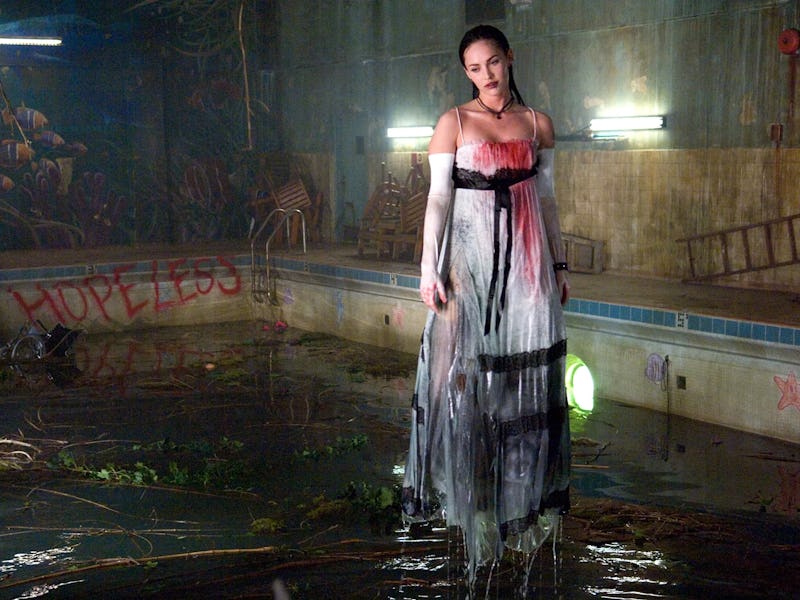A Misunderstood Satanic Satire Is Now a Pulpy Feminist Classic
It’s not easy being a teenage succubus.

There are few films more of their time than Jennifer’s Body. The success of the movie can be measured almost exclusively in its re-appraisal after it crashed and burned at the box office while being panned by critics when it was released 15 years ago on September 18, 2009. Reviews called Jennifer’s Body “self-conscious” and “shallow,” an anthem for a generation that hadn’t yet come into its own. “The chances that it will be somebody else’s pop culture reference 27 years from now are slim to none,” declared one blunt critic. We’re not at the 27-year mark yet, but Jennifer’s Body has already made the jump from empty B-movie to post-feminist cult favorite.
Written by a post-Juno Diablo Cody and directed by Karyn Kusama, the film follows Jennifer Check (Megan Fox), the consummate popular girl of a small town called Devil’s Kettle who becomes possessed by a demon after a virgin sacrifice gone wrong — much to the chagrin of her codependent best friend Needy (Amanda Seyfried). Jennifer’s dynamic with Needy is complex, messy, and pockmarked with a plethora of zingers that haven’t aged well, but beneath Cody’s crude prose lies a darker story about the horrors of female adolescence. It goes far beyond the film’s endlessly-quoted thesis, “Hell is a teenage girl,” to pick at something deeper, asking why girls like Jennifer turn into monsters and how they share that fate with girls like Needy.
Much has been said about the irony of Jennifer’s Body; its salacious marketing campaign, the then-public consensus surrounding its star Megan Fox, and how the latter unfortunately informed the former. Fox was fresh off a star-making turn in Transformers, which turned her into a sex symbol overnight, and producers naturally saw fit to capitalize. The film was positioned as a male-targeted answer to Twilight, a film that would indulge the fantasies of millennial boys through a pulpy, supernatural lens. The problem was, Jennifer’s Body is not that film at all.
Instead, Cody, Kusama, and Fox peel back the layers of the monstrous feminine and a handful of tired tropes for female characters. Jennifer is, at turns, the mean girl, the siren, and the martyr, and at every transition, it’s clear who’s thrust these roles upon her. Cody’s script paints a careful portrait of a girl torn apart by impossible beauty standards and a craven need for validation. When a fledgling indie rock band murders Jennifer in a scene that’s both a ritual sacrifice and a not-so-subtle metaphor for assault, her soul is consumed by a succubus, and all those internal insecurities are suddenly made manifest in a craving for human flesh.
Jennifer used her body as social currency even before her possession, but after gaining the powers that come with her demonic possession, the benefits now clearly outweigh the costs. Each time she lures a boy into the woods with the promise of sex only to kill him and feast on his guts, Jennifer earns abilities like strength, regeneration, and the power to fly (or at least hover). The catch is that she has to continue to hunt, kill, and consume to keep up appearances. As the bodies pile up and Jennifer’s appetites grow reckless, it falls to Needy to dole out an ego check.
Jennifer’s Body is less about bloody kills than its prickly female friendship.
So no, Jennifer’s Body is not just “Twilight for boys.” It’s much more complex and prickly, and it’s utterly enamored with the grisly grey areas of adolescence. No one here is really a hero, and that includes Needy, who narrates the story a few weeks after her inevitable clash with Jennifer. Like Fox’s seductive anti-heroine, Needy is much more than just a soft-spoken saint. Cody deftly uses these characters to cycle through every high school cliché in the book, and Kusama’s direction only further cements this metaphor for misogyny as a modern myth.
In hindsight, Jennifer’s Body anticipated the #MeToo movement and set the tone for rape-revenge fantasies before either was a thought in anyone’s mind. It exists at an intersection between female-led fantasy and horror, but it’s also just a really fun film about a hot girl who kills boys. It always has been. The only difference now is that it can tap into the niche it was always made for.